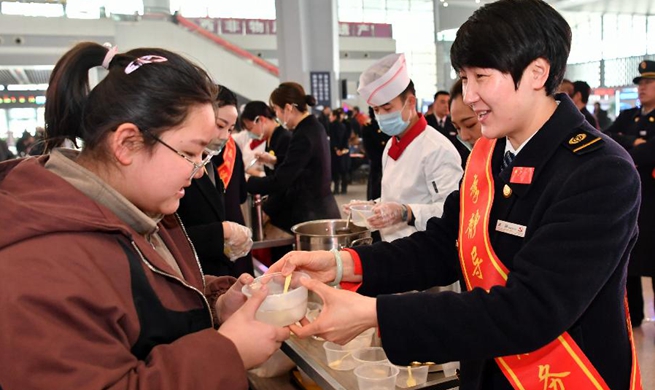ROME, Feb. 19 (Xinhua) -- Italy's industrial turnover and orders declined sharply in December, national statistics institute ISTAT reported Tuesday, prompting alarm bells from Confindustria industrialists association and opposition lawmakers.
The bad news comes as Italy officially entered a recession following two consecutive quarters of negative gross domestic product (GDP) growth, and amid sluggish global trade, uncertainties over Brexit, and a slowdown in German economy, which is closely linked to Italy's economy.
Seasonally adjusted turnover contracted by 7.3 percent in December compared to the same period in 2017, plunging by 7.5 percent on the domestic market and by 7 percent on the foreign market. Transportation manufacturing posted the biggest losses (-23.6 percent), followed by pharmaceuticals (-13 percent) and chemicals (-8.5 percent), ISTAT said.
Industrial turnover contracted by 3.5 percent in December compared to the previous month and by 1.6 percent in the fourth quarter compared to the third, ISTAT said. The decline affected the domestic market (-2.7 percent) as well as the foreign market (-4.7 percent).
Month-on-month, all sectors posted negative trends, led by energy (-9.7 percent), and followed by capital goods (-5.5 percent), consumer goods (-1.8 percent), and intermediate goods (-1.7 percent).
Orders also dropped, by 1.8 percent on a monthly basis, by 2 percent on a quarterly basis, and by 5.3 percent compared to the previous year. Year-on-year, orders declined both on the domestic (-3.6 percent) and the non-domestic (-7.6 percent) markets, with the sharpest drop in the electrical equipment sector (-21.4 percent).
"The ISTAT data impose on everyone a duty and a responsibility to react," Confindustria tweeted. "We must ask ourselves what kind of country we want to be: if we want to remain one of the leading industrial powers in the world, we must take action accordingly, and fast."
In tweeted comments, Confindustria chief Vincenzo Boccia said the ISTAT data means the country must react "to a slowing (international) economic context, which has reached our home because ours is a highly export-oriented country."
"The industrial issue has become a national issue," Boccia told RAI News 24 public broadcaster. "As we have been saying for a while, opening construction sites across Italy would allow us to avoid the negative effects of the global economic slowdown and create jobs and infrastructure while increasing the country's competitiveness."
"Industrial turnover is at its lowest point in the past 10 years," tweeted former prime minister Paolo Gentiloni of the opposition Democratic Party. "We would expect a reaction from the government. But I imagine the competent minister is on the campaign trail. Maybe it's the lesser of two evils".
"The ISTAT industrial data are comparable only to those of 10 years ago (2008-2009)," tweeted Renato Brunetta, an economy professor and former minister from Silvio Berlusconi's opposition Forza Italia party. "Today we find the same contractions and drops, except that today the crisis is Italy's only."
The latest negative economic data comes on the heels of further bad news last week, when ISTAT and the Bank of Italy reported national exports were down by 2.7 percent in December 2018 compared to the previous year, while public debt rose from 2.2635 trillion euros or 131.2 percent of gross domestic product (GDP) at the end of 2017 to 2.3167 trillion euros at the end of 2018.
On a yearly basis, the countries that most contributed to the drop in exports were Turkey (-32.9 percent), China (-15.2 percent), the U.S. (-5.7 percent), and the Organization of Petroleum Exporting Countries (OPEC) area (-8.3 percent), according to ISTAT.













